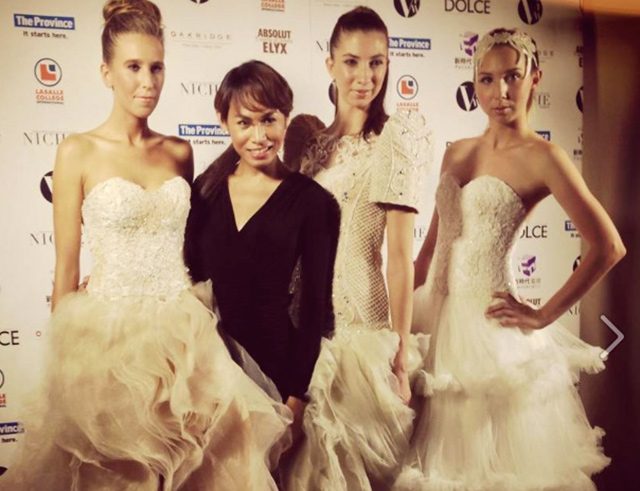SUMMARY
This is AI generated summarization, which may have errors. For context, always refer to the full article.

MANILA, Philippines — “Lalaki pa rin ‘yan, (He’s still a man)” a club bouncer commented even after top Filipino designer Veejay Floresca showed her California State ID that indicated her female name and gender marker.
According to the transgender designer, this happened as she was being stopped from entering the high-end lounge and bar Valkyrie in Taguig City on Saturday night, June 20.
“I was denied twice. They said they have a no-cross-dressers policy,” Floresca told Rappler, recalling there was also an attempt to stop her from entering the bar the previous weekend.
Floresca said while she respects the rules of Valkyrie, she particularly wants the ban lifted.
“I propose they should change the dress code policy,” stressed Floresca.
“I felt bad not for myself but for other transgender women who don’t have female IDs, who were embarrassed, who felt discriminated,” she lamented.
Unlike in the Philippines, California allows transgender people to petition courts to legally change their names and gender. A law, fully implemented in 2014, made it “safer and cheaper” for Californians to change their identity documents without going through complicated court requirements.
Valkyrie owner apologizes
Valkyrie Club is yet to release an official statement on the incident, but Floresca said that one of the club owners called her on Sunday, June 21, to apologize.
“He apologized and promised to do something to improve their policies,” Floresca said.
“I felt that we should tell them [Valkyrie] to analyze and understand the difference between a crossdresser and a transgender. There’s a significant difference,” Floresca stressed.
“For me, a club or a bar is a place to party and have fun. Wear anything you want,” said Floresca.
Crossdressing is a form of gender expression, which does not necessarily reflect one’s sexual orientation and gender identity, according to the American Psychological Association (APA).
“People who cross-dress wear clothing that is traditionally or stereotypically worn by another gender in their culture,” APA said.
Meanwhile, transgender people are those whose assigned sex at birth does not match with how they identify themselves. A person does not have to undergo surgery or hormonal therapy to be a transgender person.
Top fashion designer
Floresca, who was born and raised in the Philippines, started her career as a fashion design student at the De La Salle-College of Saint Benilde. In 2007, she was celebrated as among the country’s top 25 designers. The following year, she won 3rd place in Project Runway Philippines.
Floresca’s creations have received international acclaim, reaching Japan, United Kingdom, USA, and China. In 2012, she received her Masters in Fashion at the Academy of Art University in California.
Floresca was also lauded by Go Negosyo as among the country’s “most inspiring entrepreneurs.”
But despite the achievements of Floresca and others from the lesbian, gay, bisexual, and transgender (LGBT) community, they are still vulnerable to discrimination, advocates said.
Discrimination and misinformation
Discrimination, according to advocates, is rooted in misinformation, saying that many Filipinos do not understand sexual orientation and gender identity (SOGI).
“Regardless of what a person looks like, what their sexual orientation and gender identity (SOGI) is, whether they legally changed it or not, establishments should treat their customers as people,” said Ging Cristobal of the ASEAN SOGI Caucus and the International Gay and Lesbian Human Rights Commission.
“At kung bastos kayo, the LGBT community should not support you,” she added.
Cristobal observed that some businesses stereotype transgender people as sex workers and con artists.
Cristobal recalled an incident in 2006 when actress Inday Garutay was kicked out of Aruba Bar for cross-dressing.
Not a crime to be transgender
“We chose to be the person who we are. And it’s not a crime to choose to be us,” Floresca said.
Although the Philippine government does not criminalize “cross-gender behavior,” some public and private establishments continue to sanction these behaviors, the Society of Transsexual Women of the Philippines (STRAP) said in a statement to the United Nations back in 2012.
To address such issues, the 2013 Philippine National LGBT Community Dialogue advised the country to integrate SOGI awareness and protection with policies on education, health, employment, family affairs, religion, and the media. These recommendations, however, are yet to be followed.
The Philippines’ anti-discrimination bill has been pending in Congress for years. Although there are some local governments implementing their own ordinances, without a national law, Cristobal said many other Filipinos like Floresca would continue to experience discrimination. – with reports from Voltaire Tupaz/Rappler.com
June is #PrideMonth. Got stories to tell? Share them with move.ph@rappler.com. Speak up on #GenderIssues!
Add a comment
How does this make you feel?
There are no comments yet. Add your comment to start the conversation.